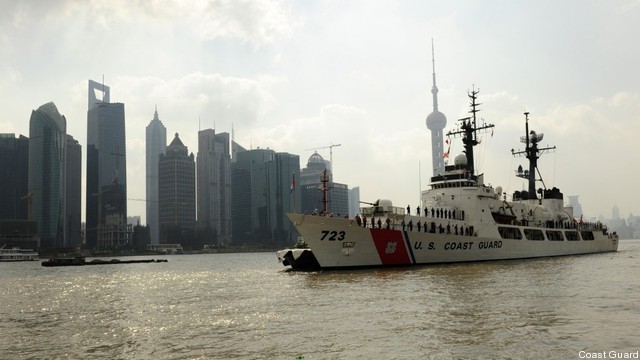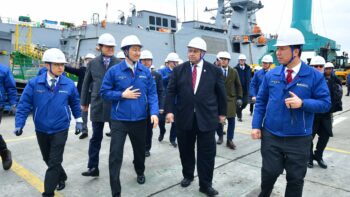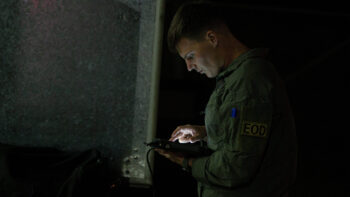 NATIONAL HARBOR: China bullies its neighbors, hacks computers around the world, and tests a missile designed to sink American aircraft carriers. The US Navy reallocates its newest and most combat-capable warships to the Pacific. The retired Vice-Chairman of the Joint Chiefs of Staff, the sinophilic Gen. James “Hoss” Cartwright, says the Air Force and Navy’s high-profile AirSea Battle concept “is demonizing China.”
NATIONAL HARBOR: China bullies its neighbors, hacks computers around the world, and tests a missile designed to sink American aircraft carriers. The US Navy reallocates its newest and most combat-capable warships to the Pacific. The retired Vice-Chairman of the Joint Chiefs of Staff, the sinophilic Gen. James “Hoss” Cartwright, says the Air Force and Navy’s high-profile AirSea Battle concept “is demonizing China.”
But amidst these tensions — indeed, precisely because of them — American officers are eager to build relationships with their People’s Liberation Army counterparts to prevent misunderstandings and defuse any potential conflict, preferably before it even begins. “Strengthening our military-to-military relationship with China” is listed in the Pentagon budget proposal released Wednesday as a priority to be protected from funding cuts, singling out an annual search-and-rescue exercise in Hong Kong (SAREX) involving both militaries as an example. This month, the Chinese even formally accepted the Navy’s inivitation to participate in the massive multinational Rim of the Pacific (RIMPAC) exercise for the first time.
The problem is the US military still lags well behind where it wants to be on building amicable ties with China. In fact, said two admirals at this week’s Navy League Sea-Air-Space conference outside Washington, US civilian agencies are way ahead of the military in building relationships with Beijing — and of the armed services, it’s the tiny Coast Guard that is out in front.
“We can get into places that our counterparts cannot,” said Rear Adm. William Lee, the Coast Guard Commandant’s deputy for operations, plans, and strategy. “We have made several visits with Coast Guard cutters to China. We have just hosted a Chinese vessel in Honolulu for talks.” To police Pacific fisheries, Coast Guard liaisons sometimes ride aboard Chinese ships, Chinese liaisons ride the Coast Guard’s, and, said Lee, “we have agreed their law enforcement folks can board US fishing vessels and vice versa.”
That said, the Coast Guard is too small to carry the burden on its own: “We’re looking with a keen eye to the Asia-Pacific,” said Lee, “[but] rebalancing is almost impossible with the current size of the fleet because we have another ocean opening up in the Arctic.”
Still, the Navy looks a little envious at the Coasties’ access to China. As a hybrid of armed service and law enforcement agency, standing outside the Department of Defense, “the Coast Guard has been outside the stovepipe of ‘military-to-military,'” said Rear Adm. Michael Smith, director of strategy and policy on the Navy’s Pentagon staff, “so they’ve been able to continue their relationship, which is absolutely wonderful for us.”
By contrast, exchanges between the Defense Department and the People’s Liberation Army have been “treated as an on-off switch,” Smith lamented. Whenever Beijing and Washington wanted to signal displeasure with each other — for example, after a PLA fighter and a US Navy spy plane collided off Hainan Island in 2001 — “it’s been the military-to-military relationship that has been terminated.”
“Everything else is flourishing,” Smith sighed. When he visited Beijing with a multi-agency delegation, “I was just struck, dumbfounded almost, by the extent of cooperation between our governments,” recalled Smith, who was an aide to Adm. Robert Willard, at the time chief of the military’s Pacific Command. All sorts of US cabinet secretaries were seated at “a very long table” with their Chinese counterparts, he said, “discussing the intricacies of trade, the intricacies of policy.”
By contrast, “Adm. Willard’s counterpart was a one star in the PLA Navy. Nothing against one-stars but they’re not very important,” said Smith, a one-star himself, to general laughter. “We had a discussion with Gen. Ma, who was the ‘barbarian handler’…. He was the guy you always saw.”
Relegating US-China contacts to a small number of specialists means that the PLA’s operational commanders won’t have any familiarity with their US counterparts, making it harder to defuse conflicts and crises. “There’s a lot of questions about whether the Chinese are willing to answer the phone if there’s an incident, and if they do answer, who is it?” said the panel’s moderator, Center for a New American Security scholar Patrick Cronin. If the only people the US can contact aren’t the ones calling the shots — perhaps all too literally if an standoff escalates — they can’t prevent potentially lethal misunderstandings.
“We have to build an enduring, lasting military-to-military relationship that expands and includes all levels and all ranks,” from petty officers to admirals, said Smith. “We have to leverage the many areas where we have common interest,” he went on, from counter-piracy patrols to humanitarian relief, “[to] build trust so we can get to the more contentious areas.”
Those contentions include an incipient arms race in the Western Pacific, where China has increasingly invested in long-range missiles, precision guidance, and other systems that could hold a US carrier battle group at bay. For its part, the US Air Force and Navy have come up with their “AirSea Battle” concept specifically to defeat such sophisticated “anti-access/area denial” defenses. Iran’s force of anti-ship missiles and fast attack boats also comes up in the AirSea Battle discussion, but the concept is widely seen as focused on the PLA — so much so that retired Gen. Cartwright said it was “demonizing China.”
“I worked for Gen. Cartwright. I have a great respect for him, he’s absolutely brilliant,” said Smith in answer to a question from Breaking Defense. “[But] this is not about demonizing China. This is about using taxpayer money as efficiently as possible” — that is, without the Air Force and Navy investing in redundant efforts — “to defend our national interests wherever they might be threatened.”
“We’ve lost the strategic narrative on AirSea battle,” Smith sighed. “We in the military need to do a much better job articulating what our goals are.”
Said one member of the audience: “Perhaps, to please people, we could change ‘AirSea Battle’ to ‘AirSea Hug.'”
SECNAV floats idea of co-production with foreign shipyards
Del Toro has repeatedly praised shipbuilders in South Korea and Japan for their abilities to keep construction efforts on time.


























